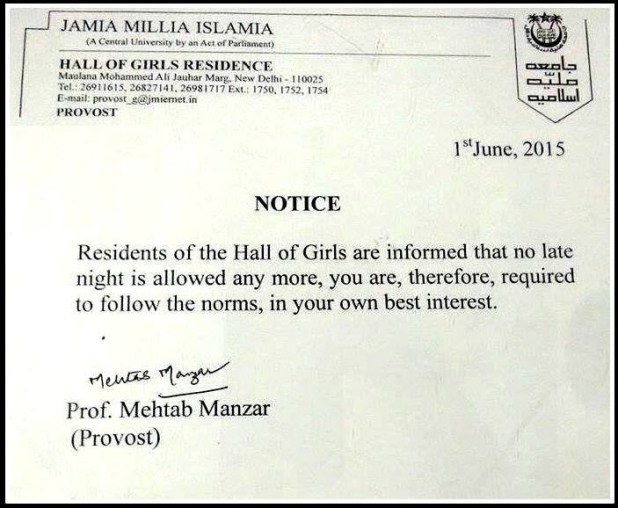On their return from home for the new academic year, Jamia girls hostel residents were shocked to find a new hostel policy forbidding them from taking any “Late Night Out” from now on.
Late Night Out is a rare privilege Jamia girl hostellers are allowed to avail twice a month if they ever wish to stay out a couple of hours beyond their regular curfew time of 8 pm., thus requiring them to return back to the hostel by 10 pm at the latest, according to a Jamia girls hostel resident. Furthermore, to avail a Late Night Out, girls are required to get signed permission from their local guardian a day in advance, and then produce another signed slip from their local guardian on their return. And all this paperwork for the privilege of staying out only a couple of hours twice a month. [To know more, refer to Hall of Girls Residence, JMI, Manual: Link]
![[Click to enlarge]](https://i0.wp.com/jamiajournal.com/wp-content/uploads/2015/08/Declaration-by-Parents1.jpg?resize=150%2C150)
One of the girls who brought this to Jamia Journal’s attention — and who wishes to remain anonymous for fear of reprisal by Jamia hostel authorities for speaking out against the new policy — is clearly agitated and perturbed by it. She told Jamia Journal:
“The hostel authorities want to control the lives of the girls that live in the hostel it seems. In the first place, the number of late nights allowed was only two per month, now even that “privilege” has been taken away from us. A lot of us find it difficult to find shelter for the night, and now we can’t even think of coming back to the hostel after 8 p.m.
“This new policy makes me feel agitated. It’s like they are telling me that I cannot take responsibility of myself and hence they need to dictate to me and other girls (and only because we are GIRLS) when and where to go. The discrimination makes me feel that I am being thought less of a human being.
“Lets be honest here, the hostel rules are blatantly sexist. They have no such regressive rules for the boys hostel. Neither do the boys have to give attendance at any time nor do they have to take permission to be outside. If security is the concern (which is not their concern as the hostel authorities have declared is not their responsibility once the student is out) then what about the security of boys? There are all kinds of crime in the world, afterall?”
To put this issue in perspective, it bears mentioning here that these university students who are required to get permission from their parents/local guardians for staying out late at night are legally adults with the right to adult franchise, which gives them the power to have a say in who will govern our country, and the power to dictate laws of the land through their elected legislative representatives. These same university students are then treated as children by public officials of a state-funded university. The irony is almost palpable.



I have stayed in hostels for a good part of my student life and I would not hesitate to say that the authorities in Jamia Girls’ Hostel hold the most regressive thoughts about how to run a hostel. They view the girls staying in the hostel with a permanent eye of suspicion. It is appalling that despite being an educational institution, there is no provision for the girls to even access the library post 8pm whereas boys have no such restrictions, in terms of library or anything else at all. And this was the case when I was a Masters student of almost 21 years of age. There have been many days when I have managed to slip out of the hostel(using differnet tactics) for various purposes, both academic and otherwise and have ended up trying to figure out friends’ places where I could spend the night as I obviously, could not go back to my room in the hostel. Thanks to friends in JNU, I managed to be safe and also have a good nights’ sleep. While its easy for the authorities to say that the girls who do not wish to abide by the rules should live outside, it is my right which cannot be denied to me to demand for appropriate accommodation to be provided to me by the public institution. I think its really important that the girls speak out about this kind of treatment meted out to those living there.